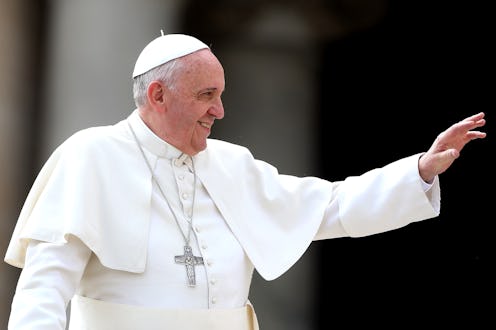News
Pope Francis Canonizes Palestinian Saints
Several days after officially recognizing Palestine as a state, Pope Francis canonized two nuns who lived in Palestine during the Ottoman era. In a Sunday ceremony in St. Peter’s Square, Francis declared four new saints — including Marie Alphonsine Ghattas and Mariam Bawardy, the first Palestinians to be conferred sainthood in modern times. The ceremony — seen as a gesture of solidarity towards beleaguered Christians in the violence-ridden Middle East — was attended by Palestinian President Mahmoud Abbas and over 2,000 Christian pilgrims from the region, according to BBC.
“As the Holy Land, wrecked by violence and dissent, has for some time had a tarnished image, our two saints emerge to restore its sanctity, reminding us that sanctity is possible even in the most difficult circumstances,” Father Rif'at Bader, of the Catholic Center for Studies and Media in Amman, Jordan, was reported by the Vatican Network as saying. “Veneration of the two new Palestinian saints will now be encouraged by the Vatican among Catholics around the world, not just in the Middle East,” BBC’s David Wiley noted.
Bawardy, born in 1843 in a village near Nazareth, suffered persecution from an early age. Her parents, Greek Catholics from Syria and Lebanon dwelling in a Muslim-majority area, were continually targeted for their faith, and Bawardy herself was nearly killed in a brutal assault launched because she refused to convert to Islam (her throat was supposedly slit by a servant). She went on to become a mystic, and founded convents in India and Bethlehem.
“Poor and uneducated, she was able to counsel others and provide theological explanations with extreme clarity, the fruit of her constant converse with the Holy Spirit,” the pope said Sunday. “Her docility to the Spirit also made her a means of encounter and fellowship with the Muslim world.”
Ghattas was born to a Palestinian family living in Jerusalem and co-founded the Congregation of the Rosary Sisters, which now focuses on education. “Ghattas came to understand clearly what it means to radiate the love of God,” Francis said, “and to be a witness to meekness and unity. She shows us the importance of becoming responsible for one another, of living lives of service one to another.”
The number of Christians living in Israel and the Palestinian territories has dwindled to less than 2 percent of that population — but the minority had cause for celebration Sunday. “As Christians, this is a sign of hope, this is a light in the tunnel,” Father Jamal Khader, the Latin Patriarch of Jerusalem, told CNN. “Especially now in the Middle East, with all the events, with all the violence. We are celebrating the lives of two saints who worked humbly for everyone and who proved to be true followers of Jesus Christ.”
Nashat Filmon, the director of the Palestinian Bible Society, echoed that sense of hope. “It's a message for the whole world that Palestinian Christians do exist in this land, and that Palestinian Christians have a heritage of more than 2,000 years,” he said in a CNN interview. “And the journey continues.”
Pope Francis has a fairly interesting canonization history, and Sunday’s ceremony isn’t the first time he has declared sainthoods for individuals hailing from more unusual pockets of the Catholic world. In January 2015, Francis canonized Joseph Vaz, giving the world its first ever Sri Lankan saint. Catholics make up only around 7 percent of the Sri Lankan population, and they greeted the news with jubilation.
In November last year, two of the six saints canonized in a Vatican ceremony were from the Indian state of Kerala, members of the Syro-Malabar Church (which operates in full communion with Rome). Around 20 percent of Kerala are Catholics, and 5,000 of the state’s faithful travelled to St. Peter’s for the canonization of Eufrasia Eluvathingal and Kuriakose Elias Chavara. “They dedicated themselves, without holding back, to serving the least and assisting the destitute, sick, elderly and pilgrims,” Francis told the crowd.
Indeed, Francis' championing of the earth’s downtrodden (he has said, “I would like to see a church that is poor and is for the poor”) is perhaps reflected in his canonization choices. Last year, the National Catholic Reporter noted that saint-making is an extremely expensive process, involving drawn out investigations to ensure the candidate is up to scratch. Because of this, saints from the laity and from poor and far-flung places have historically been under-represented.
This is seemingly something Francis wishes to address. Having met a Cambodian woman in South Korea last year, he reportedly promised to speak with “my friend Angelo” — the head of the Vatican’s saint-making office — about the dearth of Cambodian saints.
Images: Getty Images (3)
